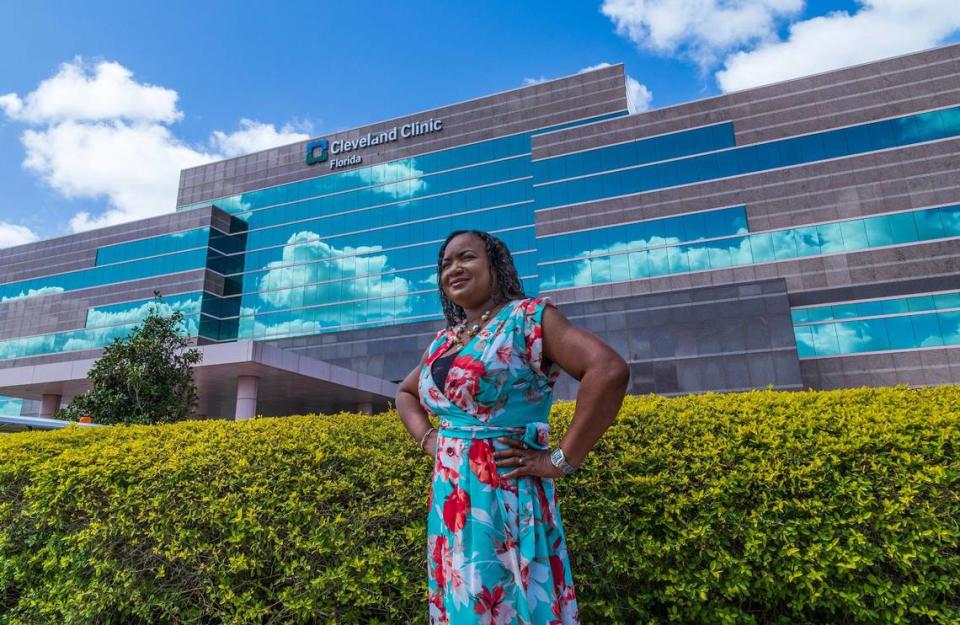How AI is helping South Florida’s Black and Latino residents manage their health
In 2001, Severence MacLaughlin was immersed in his work as a doctoral student researching computational biology. Many of his days were spent recording data using a mainframe computer that took up an entire room. One question continued to bug him.
“As I was coding the data, I wondered why businesses didn’t use data to make business decisions,” he said.
MacLaughlin, 45, is the founder of DeLorean Artificial Intelligence, a Palm Beach-based healthcare company that uses data from patients’ medical records to predict possible health outcomes before they escalate.
Founded in 2019, DeLorean works directly with doctors and healthcare companies and is currently used at 450 dialysis centers across the country. MacLaughlin believes DeLorean’s technology is 95% to 99% accurate at predicting infection and hospitalization rates.
The technology also examines where there are healthcare deserts so that companies can increase their number of practitioners to better serve communities — just one way AI is increasingly being used in healthcare to assist patients from marginalized backgrounds.
Weston-based doctor Yasser Rodriguez’s adoption of AI into his own treatment strategy started when he read a survey about the use of wearable devices in Black communities. Like MacLaughlin, Rodriguez, 40, agrees that access to healthcare is an issue for Latinos and Black Americans. Using AI via wearable technology can be a solution, he believes. Heart signal tests like electrocardiograms (EKG) that were previously only available via a hospital visit can now be pulled up on an Apple Watch.
“I have 80-something-year-old patients coming into the clinic with their Apple Watches and showing me their EKGs,” Rodriguez said. “Elderly patients are all about it. It’s really important as a provider to teach patients about it.”
Fort Lauderdale social worker Nicole Smith, 53, came to understand the value of app technology after she had a stress-related cardiac arrest in November while visiting her father in the emergency room. The incident left her in a coma for three and a half days.

To better monitor her health, Smith had a defibrillator implanted, and the Abbott ICD app now allows her to track her heart’s rhythms via her Galaxy smartphone.
Initially, she was skeptical about having a defibrillator, but she eventually came to see the device’s tracking potential as an advantage in being able to recognize a similar health issue if it happens again.
READ MORE: Virtual reality, facial recognition. How AI is reshaping healthcare in South Florida
Rodriguez said he considers the addition of AI through wearable tech a game changer, especially for Hispanics and Black Americans for whom socioeconomic barriers have historically made it difficult to access healthcare.
And the development of wearable technology in the last five years has impressed Rodriguez. Many wearables have long detected heart rate and pulse through sensors that use green light to measure things like blood oxygen levels. Unfortunately, for patients with darker skin pigments the green wavelength was not as precise, he said.
“It was known for years, and when COVID started in 2020, Apple changed up and designed a stronger sensor that compensates for that,” he said. “Fitbit also changed the intensity of the green wavelength.”
Nevertheless, wearable technology can be expensive for patients. To circumvent those costs, Rodriguez said devices like remote blood pressure monitors and medical-grade patches can be prescribed to patients, allowing them to transmit health data remotely to clinics. Other devices synchronize via Bluetooth with pacemakers and defibrillators, like the one Smith uses after her cardiac arrest.
As Smith adjusts to a new healthcare routine, she believes in the importance of other Black Americans getting regular checkups and seeing a doctor. Culturally, she’s noticed a stigma around Black people seeking healthcare that she hopes will change.
“If we’re not dying, we’re not going to the doctor,” she said. “We always have a home remedy or tend to gloss over stuff. Find a doctor you feel comfortable with. If you have a doctor not listening to you, find another one.”

